Over the past half-century, globalisation has had a profound positive impact on our lives. The free movement of people, goods and ideas across borders has increased access to consumer products and services, technology, healthcare and education, lifting millions out of poverty and improving general living standards. Recent times, however, have seen globalisation come under fire as governments enact protectionist policies, the global wealth gap widens, and worries loom over the possibility of a financial crisis or epidemic spreading quickly around the world — as has come to pass with the COVID-19 outbreak.
Amid this turmoil, the higher education sector occupies a unique space. To ensure students receive a well-rounded education and are prepared for the workforce, universities are inherently global in nature (or at least aspire to be). This is evident in all aspects of the university experience, from the faculty and students who come from different countries and interact both on and off campus, to those who go on study, internship or research stints abroad, as well as the alumni diaspora who live and work all over the world.
Such is the case at NUS, which has adopted an ambitious Vision to become “a leading global university shaping the future”. But what exactly does this mean for a University that has long prided itself on being a globally-oriented institution? In today’s contentious climate, where does NUS see itself in relation to the wider world and what role does it seek to play? The answer, as one might expect, is multifaceted.
 DID YOU KNOW?
DID YOU KNOW?
Every year, some
2,000 NUS students embark on the Student Exchange Programme and about
2,000 incoming students are also received from partner universities.
ALL ROADS LEAD TO ASIA
There’s no denying that NUS has achieved a lot on the world stage since the turn of the millennium under the past NUS Presidents, Professor Shih Choon Fong and Professor Tan Chorh Chuan (Medicine ’83). The University further strengthened its education and research pillars and advanced enterprise, both at home and overseas. Collaborations such as Duke-NUS Medical School and Yale-NUS College were cemented. Curricular and co-curricular offerings were infused with a global perspective. And the international academic community steadily grew.
Now ranked among the top universities in Asia, NUS is highly spoken of on a global level. Mirroring Singapore’s evolution as a ‘global city’, the University regularly attracts international students and staff as well as world-class researchers. A milestone was reached in 2019 with the arrival of Nobel Prize-winning physicist Professor Sir Konstantin Novoselov at the NUS Department of Materials Science and Engineering, making him the first Nobel laureate to join a Singaporean university.
Pondering the question of “where to next?” for the University, its current President Professor Tan Eng Chye (Science ’85) tells The AlumNUS that to stay relevant, NUS’ strategic plan should reflect the international scene. The University’s Mission — “to educate, inspire and transform” — is focused on peoples and nations where it can have the biggest impact. Increasingly, that looks to be in Asia, particularly the developing countries of Southeast Asia.
![]()
The fact that NUS is a leading university situated in Asia gives us a unique vantage point. We want to see the region do well in the years ahead because that will bring greater opportunities to our community, and to Singapore.
Prof Tan Eng Chye, NUS President
Whichever way one spins it, global economic power is shifting to Asia. Fuelled by its large and growing population and its swelling middle class, the Association of Southeast Asian Nations (ASEAN) is projected to become the world’s fourth-largest economy by 2030, behind the United States, China and the European Union. Management consulting firm McKinsey forecasts that by 2040, Asia will generate more than 50 per cent of the world’s gross domestic product (GDP) and account for 40 per cent of global consumption.
It is thus a very opportune moment to be in Singapore, at the crossroads of Asia and a central node within Southeast Asia. NUS is well-placed to serve in a leadership capacity and support the overall advancement of the region, as commented on by NUS’ Chief Communications Officer Ms Ovidia Lim-Rajaram (Arts and Social Sciences ’89): “A global university, to me, is about a whole-of-university approach, consciousness and culture. At NUS, there is a strong sense of self, of our national flagship role and rootedness in multicultural Singapore. Being Singaporean, Asian and global puts the University in a particularly relevant position in today’s interconnected world.”

NUS’ spot in the Quacquarelli Symonds (QS) World University Rankings 2020 (tied with Nanyang Technological University)
BROADENING HORIZONS
A smorgasbord of options is available to encourage NUS students to venture outside Singapore at some point during their undergraduate years. NUS faculties and schools offer joint degree programmes, where students alternate between studying at NUS and the partner university. The Centre for Future-ready Graduates (CFG) runs the NUS Global Internship Programme to help students gain valuable overseas work experience. NUS Enterprise’s NUS Overseas Colleges (NOC) programme also allows entrepreneurial-minded students to serve as interns while taking classes at 11 different start-up hubs worldwide, including one within Southeast Asia (NOC SE Asia).
By far, NUS’ largest and most established global programme is the Global Relations Office’s (GRO) flagship Student Exchange Programme (SEP), with a network of more than 300 partner universities in over 40 countries. NUS undergraduates keen on spending a semester abroad can choose from any of these destinations, while reciprocally the University also welcomes students from foreign peer institutions to come to Singapore and study at NUS. GRO also offers shorter summer and winter programmes, international research attachments, as well as Study Trips for Engagement and EnRichment (STEER).
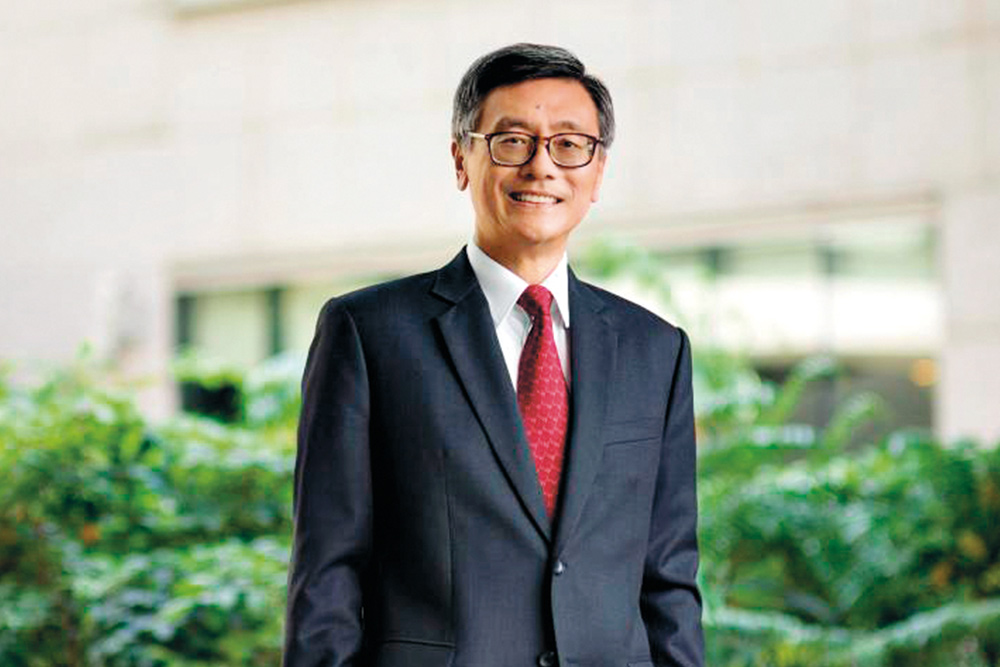
Q&A WITH THE NUS PRESIDENT
What are your thoughts on the projected dominance of Asia?
Prof Tan: The “Asian Century” is well underway. This is a shift of immense economic, political and cultural significance not seen since the arrival of Western colonialism and the onset of industrialisation more than 200 years ago. Recent events, such as the US–China trade disputes and the ongoing COVID-19 health outbreak, have introduced near-term uncertainty, but the long-term trends remain robust.
What role can NUS play within this sphere?
Prof Tan: The fact that NUS is a leading university situated in Asia gives us a unique vantage point. We want to see the region do well in the years ahead because that will bring greater opportunities to our community, and to Singapore. Singapore’s “brand value” as a dynamic, future-focused country, coupled with NUS’ global reputation as an innovator and valued partner, has helped in entering new markets and building new partnerships.
How can NUS alumni support the University’s initiatives in Asia?
Prof Tan: Adopt and practise lifelong learning. This could mean specifically learning about Southeast Asia and China, or more generally updating your skills and knowledge to put you in good stead when opportunities come along. The world is so interconnected now, that one good opportunity could easily lead to another. Alumni can also participate in our network of 19 Overseas Chapters, a good number of which are located in Asia; or share their knowledge and experiences, especially with the younger generation.
Through these initiatives, GRO hopes to nurture “future-ready, globally-adept graduates”, says its Associate Vice President, Professor Victor Shim (Engineering ’82). It also complements the Singapore Government’s target — as recently announced in the Budget 2020 speech — to give 70 per cent of local graduates from Institutes of Higher Learning (IHLs) an overseas experience to build their cross-cultural skills, with most of the exposure to be in Southeast Asia, China or India. For NUS, Prof Tan reveals that the goal is to go one step further and give “100 per cent overseas exposure for our students”.
To align with NUS’ strategic direction eastward, Prof Shim discloses that “GRO is seeking to increase semester-long student exchange and short-term programmes in Asian destinations, and establishing funding schemes to encourage and enable NUS students to embark on them.” For example:
- Seven summer programmes are being offered this year in partnership with the University of Indonesia, Airlangga University and Padjadjaran University (all in Indonesia), and with Mahidol University in Thailand. More summer programme destinations in Southeast Asia are in the pipeline.
- In January 2020, GRO launched the Southeast Asia Experience Award (SEA) and India Experience Award (IEA), which provide financial support to undergraduate students participating in summer or winter programmes in these countries.
- A new Service Leadership event will be introduced in August 2020 to the Temasek Foundation Leadership Enrichment and Regional Networking (TF-LEaRN) Programme @ NUS. Open to incoming and outgoing students, TF-LEaRN grooms the next generation of Asian leaders through cultural exchange, networking, community engagement and leadership development opportunities. The event will bring together TF-LEaRN scholars from all over Asia, as they hear and learn from prominent persons in Singapore who have left a positive impact on society.
PACK YOUR BAGS!
Whether enhancing their academic knowledge, immersing themselves in the culture and lifestyle of another country, or simply making new friends, these ‘NUSers’ have great things to say about their overseas experiences.
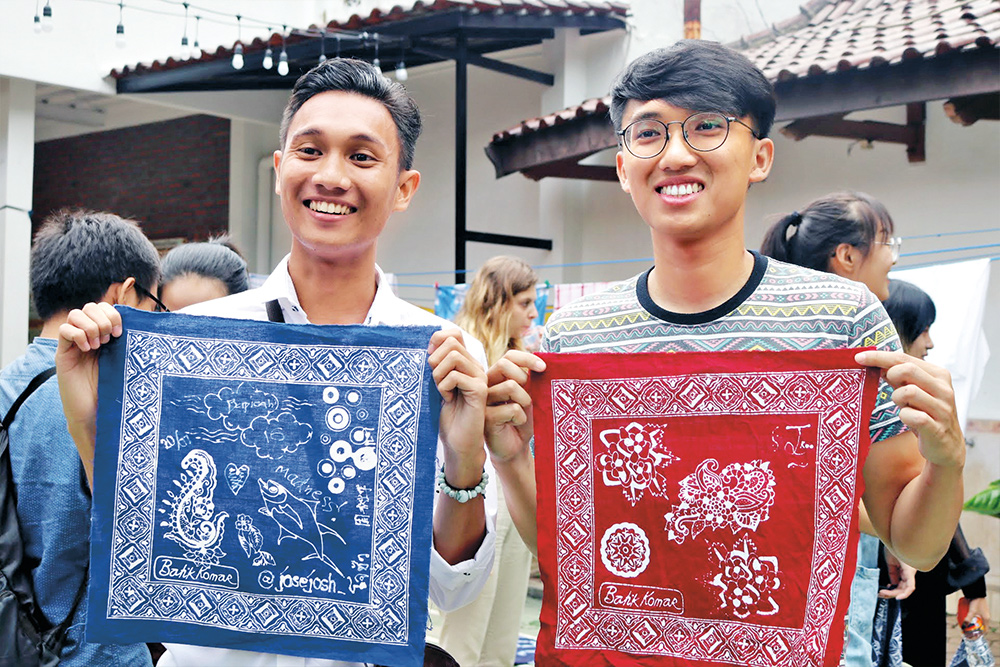 “The summer programme was absolutely amazing and worthwhile. I experienced a side of Indonesia that tourists typically don’t get to experience, and learned about the biggest economy in ASEAN.”
“The summer programme was absolutely amazing and worthwhile. I experienced a side of Indonesia that tourists typically don’t get to experience, and learned about the biggest economy in ASEAN.”
- Mr Jeremy Koo (right), a final-year NUS Law student who attended a summer programme at Padjadjaran University, Indonesia
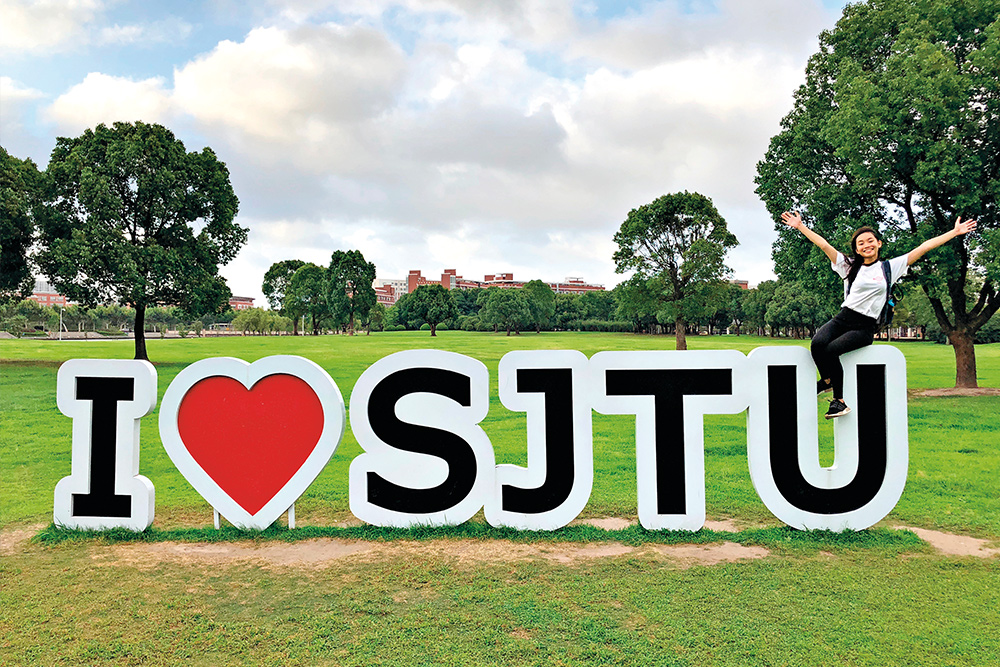 “The programme allowed me to learn about the political climate of China in comparison to other countries, both from the local professors and through group discussions with my peers from around the world.”
“The programme allowed me to learn about the political climate of China in comparison to other countries, both from the local professors and through group discussions with my peers from around the world.”
- Ms Teo Hui Yuh (Science ’19), who attended a summer programme at Shanghai Jiao Tong University, China
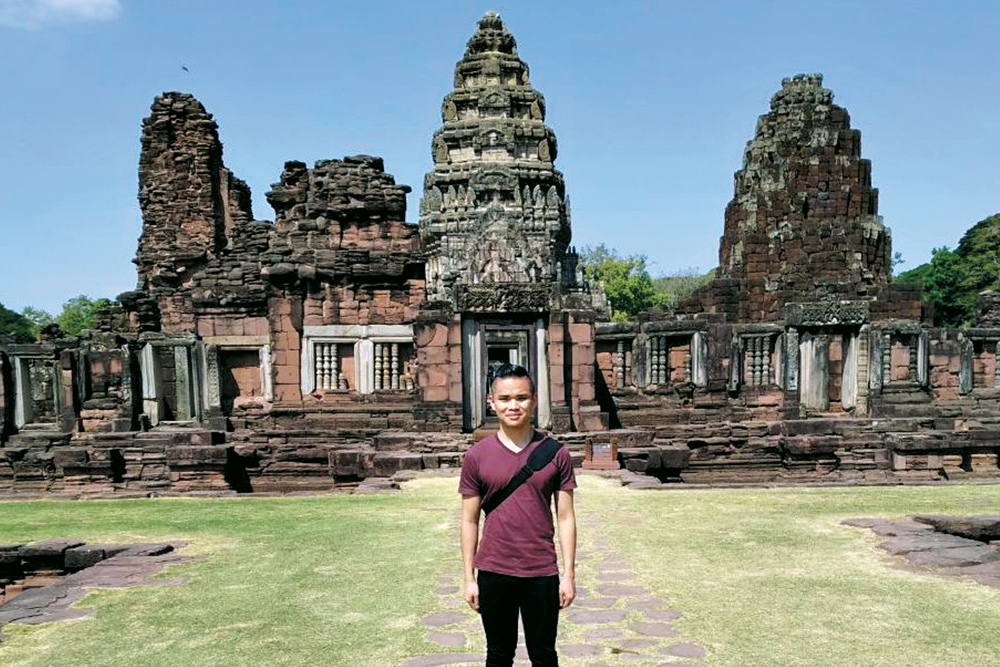 “Having to live in a new environment alongside ‘exchangers’ from different parts of the world, I initially struggled to communicate with my peers. But by organising simple gatherings, speaking with emotions and even just smiling in each other’s company, we gradually found ways to improve the way we conversed.”
“Having to live in a new environment alongside ‘exchangers’ from different parts of the world, I initially struggled to communicate with my peers. But by organising simple gatherings, speaking with emotions and even just smiling in each other’s company, we gradually found ways to improve the way we conversed.”
- Mr Tan Jun Hong (Arts and Social Sciences ’19), who attended an SEP at Chulalongkorn University, Thailand
Prof Shim acknowledges that some degree of mindset change is required on the part of students, to accord Asia a higher priority as a destination for an overseas educational experience. “Southeast Asia is often perceived as a region for tourism and leisure, hence not many students consider it for academic pursuits. Many students still desire to go farther away, to places such as Europe or North America,” he explains. “We need to help them appreciate that a stint in Southeast Asia, China or India can provide an equally rich and beneficial experience, as well as impact.”
Getting Peer Advising Leaders (PALs) — NUS students who have returned from an SEP — to share their SEP journeys in Southeast Asia on platforms such as Instagram might help, says Prof Shim. Through their accounts of how the experience has benefited their personal and professional development, student awareness and interest in Southeast Asia will hopefully grow.
![]()
GRO is seeking to increase semester-long student exchange and short-term programmes in Asian destinations, and establishing funding schemes to encourage and enable NUS students to embark on them.
Prof Victor Shim, Associate Vice President, Global Relations Office, NUS
THE CULTURAL QUOTIENT
Although strongly encouraged, travelling abroad is not the only means by which NUS students can develop into global citizens — they can do so right here in Singapore. Knowledge and understanding of global issues is front and centre in many NUS curricula, from the Global Studies major offered by the Faculty of Arts and Social Sciences, to the Master in International Affairs programme at the Lee Kuan Yew School of Public Policy, to the 13 different languages taught at the Centre for Language Studies. NUS’ diverse student population — with its mix of local and international students — also provides plenty of opportunities for cross-cultural interactions and learning, and for deep friendships and social networks to form. Having a heterogeneous student body not only adds to the vibrancy of campus life, but creates a training ground where students can practise the skills necessary to get ahead in today’s globalised workplace.
“Due to globalisation, employers increasingly expect talents to have an inclusive mindset and to be equipped with the cultural intelligence and competency to work with people across diverse backgrounds,” says Ms Corrine Ong (Business ’94), Deputy Director (Community Engagement) of the NUS Office of Student Affairs (OSA). “We adopt a multi-pronged approach to seed an inclusive mindset and culture among students through policies, training, programmes and funding, to foster intentional mixing of students across diverse backgrounds. This can be seen through residential living, classroom discussions, project groupwork and co-curricular activities (CCAs).”
Local and international students are free to mingle outside the classroom by joining CCAs which cater to all manner of interests, from performing arts and sports to faith and community service. One student club, NUS iCARE, specifically sets out to connect local and international students by organising cross-cultural appreciation events and social activities. Its SG Kaki Student Buddy Programme pairs incoming international students with local seniors to help them settle into their new surroundings. Cultural immersion programmes and events, such as ‘Singlish’ workshops, food tours and the International Games Fiesta, provide further opportunities for interaction.
For local students who wish to go overseas for volunteer work, the Youth Expedition Project (YEP) provides such an outlet. YEP is a service-learning programme by the National Youth Council that involves communities in Asia, with a focus on ASEAN, China and India. Like-minded NUS students can, as a team, apply for funding to embark on their projects and thus make a difference in those communities.
STUDENTS FOR LIFE
Insofar as NUS is a public university and has a broad mandate to advance national development, the bulk of the University’s undergraduate population is local. It has been reported that in all six of Singapore’s public universities, foreign students comprise only about 10 per cent of total undergraduate intake. However, there is much more leeway for NUS to step up its global student recruitment efforts in the postgraduate space.
Professor Susanna Leong (Law ’89), Vice Provost (Masters’ Programmes and Lifelong Education) of NUS, elaborates: “Because of the national imperative to educate our people, our undergraduate population is mostly local. Our Master’s programmes can therefore serve as a platform to attract international students and build a more diverse student population. Should some of them go on to become very influential or illustrious alumni, this will then extend our sphere of influence globally.” Considerable resources are being deployed to reach out to postgraduate candidates from Asia and all over the world. NUS staff attend overseas postgraduate fairs to meet prospective students, in addition to disseminating information through various social media platforms. “Singapore is known for its rigorous standards of education, and our NUS brand is very strong internationally. This should help us attract good students as we seek to get the best brains here,” says Prof Leong.
It was certainly a pull factor for Mr Siddharth Krishnan, who left his home country of India in 2018 to take up the Master of Engineering programme at NUS. “The fact that NUS is one of the best universities globally with regard to intensive research was a big reason why I was interested to pursue my graduate studies here,” he says. Currently finishing up his degree, the President of the NUS Graduate Students’ Society hopes to stay on at NUS for his PhD and continue his research in Materials Science.
Beyond the advanced Master’s and PhD programmes traditionally offered by universities, a relatively new area that has emerged in the global higher education sector is lifelong learning. This concept arose out of the need for the workforce to continuously refresh and expand their skillsets in today’s Fourth Industrial Revolution, where disruption is the norm and the half-life of skills is rapidly shrinking. In response to this trend, the University has unveiled a raft of lifelong learning initiatives in recent years, most notably its NUS Lifelong Learners (NUS L3) programme.
Launched in 2018, NUS L3 automatically enrols present and future students for 20 years and grants seamless access to a comprehensive, curated catalogue of Continuing Education and Training (CET) courses. “We welcome students to come back to NUS any time after they have graduated, for as long as they need the University. We embrace them as students for life — not just for four years, but 20 years,” says Prof Leong. The University has also rolled out a NUS CET500 programme for the general public, so that they, too, can acquire industry-relevant skills and stay competitive in the workplace.
![]()
We adopt a multi-pronged approach to seed an inclusive mindset and culture among students through policies, training, programmes and funding, to foster intentional mixing of students across diverse backgrounds.
Ms Corrine Ong, Deputy Director (Community Engagement), Office of Student Affairs, NUS
JUMP-STARTING START-UPS
Many of NUS’ newly-launched postgraduate programmes have something in common: they are focused squarely on innovation and entrepreneurship (I&E). In fact, a key priority for the University is to develop a bustling I&E ecosystem that spans across Southeast Asia, by fostering closer international collaboration among academia, governments and industries. Doing so will make it easier for entrepreneurially-inclined students, alumni and researchers to co-create and commercialise ideas and solutions, which could potentially benefit the entire ASEAN population of 650 million.
As Professor Freddy Boey (Engineering ’87), Deputy President (Innovation & Enterprise) of NUS, previously said in an interview with The
AlumNUS: “By enabling linkages between Singapore and Southeast Asia, and also with China, NUS can produce a high concentration of talented people moving around the region… We need to encourage Singaporeans to expand their companies overseas, as well as draw foreign talent to NUS and create an outpost for them here. That way, they can go back and use the technologies developed at NUS to transform their home countries.”
Some recent moves that have been made in this area include:
- Expansion of NOC SE Asia. Launched in 2018, NOC SE Asia initially covered the Indonesian cities of Jakarta and Yogyakarta. It has since expanded to also include Bandung, Indonesia and Ho Chi Minh City, Vietnam.
- Expansion of BLOCK71. The eighth and newest member of this tech ecosystem builder and global connector is BLOCK71 Vietnam, which was set up last November. Other BLOCK71 facilities include three in Indonesia (Jakarta, Bandung and Yogyakarta); two in Suzhou, China; San Francisco, USA; and Singapore.
- Launch of MSc in Venture Creation. This immersive programme targets aspiring entrepreneurs from Southeast Asia by providing the guidance, skillsets and opportunities to transform ideas into viable businesses. The first cohort is set to commence in August 2020.
- Opening up of NUS Graduate Research Innovation Programme (GRIP). Launched in 2018, NUS GRIP enables NUS postgraduate students and researchers to start their own deep tech companies. A similar programme for business and tech executives (including NUS and non-NUS alumni) kicked off in February 2020.
- Establishment of overseas research institutes. NUS has set up three overseas research institutes to date in China (Suzhou, Tianjin and Guangzhou); a fourth, in Chongqing, is slated to open later this year. These institutes aim to accelerate research translation and build a regional R&D talent pipeline.
FINDING FACULTY
To cultivate global citizenship in students, their educators must be globally-minded as well. NUS utilises various measures to attract and develop such faculty, from providing grant schemes for aspiring and junior local academics, to tapping on the Returning Singaporean Scientists Scheme. International faculty members are also sought after, bringing greater diversity to the academic community. Among them is Professor Itty Abraham, Head of the NUS Department of Southeast Asian Studies. Having initially moved from the US in 2012 to take up a research fellowship at the NUS Asia Research Institute, Prof Abraham hopes the University-wide focus on Asia will persuade students to see the “large possibilities”
the region has to offer:
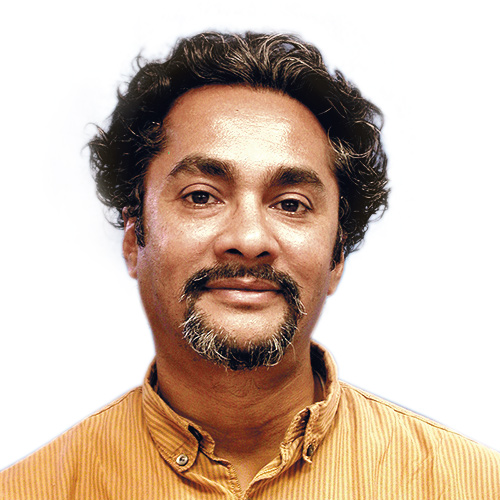
“Southeast Asia is a very exciting place to do research. Especially in developing countries, things are constantly changing and new transformations are happening. We can see the future more clearly here and engage in forward-looking research, as opposed to historical research or looking backwards to explain what has happened.”
Professor Itty Abraham, Head of the NUS Department of Southeast Asian Studies.
GLOBAL PROBLEMS REQUIRE GLOBAL SOLUTIONS
And that brings us to the current state of affairs where, as of the time of writing, the COVID-19 virus has spread to more than 80 countries. It has thrown things into disarray, and NUS has also been affected. Some student exchange and NOC programmes have been suspended. Lectures are being delivered online instead of on campus grounds. Mass events have been cancelled or postponed.
However, the NUS community is not sitting idly by. For example, Professor Paul Tambyah (Medicine ’88) from the NUS Department of Medicine — and Senior Consultant at National University Hospital’s Division of Infectious Diseases — is collaborating with local universities and hospitals on a research project to determine how exactly the SARS-CoV-2 virus spreads in the environment. “Healthcare workers have chosen a career in taking care of people who are ill. They deserve the best protection for themselves, and the best way to protect them is to understand the science behind the virus so that the appropriate personal protective equipment can be used,” says Prof Tambyah.
Elsewhere, NUS Executive MBA (Chinese) students, alumni and teachers banded together to raise funds for relief efforts in China. “In our globalised society, this is not just a severe challenge faced by our friends in China, but a grand challenge faced by the international society. Every one of us has a role to play. We should shoulder the responsibilities and obligations together to do what we can within our abilities to fight against the coronavirus,” says Mr Sun Xiushun (EMBA-C ’12), President of NUS Business School Mandarin Alumni. He is the President of Winning International Group, which donated RMB10 million to the cause.
 A MODEL TO FOLLOW
A MODEL TO FOLLOW
NUS’ lifelong learning push has been cited in an October 2019 white paper by the World Economic Forum, “A Global Standard for Lifelong Learning and Worker Engagement to Support Advanced Manufacturing”. In particular, NUS is held up as a case study to encourage worldwide provision of retraining opportunities for workers through up-to-date, university-based lifelong learning programmes.
Such solidarity is also shown at the very top by Prof Tan. Besides creating a $500,000 Resilience Fund to cover staff and student expenses incurred by the outbreak, such as cancelled flights or return flights home for SEP and NOC students, Prof Tan also penned a message of support to China alumni that was posted on various Chinese online and social media platforms in February. In his letter, he expressed concern for their wellbeing and revealed that NUS professors and senior staff had pooled together donations to set up a NUSsupportsHubeiFund, with the money going to the Hubei branch of the Red Cross Society of China.
In good times and bad, then, the University is committed to maintaining a global outlook. Socio-political, economic and cultural headwinds will no doubt recur, but that is all the more reason why NUS should stay connected to the wider world — to do otherwise would mean turning its back on its own community, and passing up the chance to make a meaningful, positive impact.
 OPENING NEW DOORS
OPENING NEW DOORS
Sometimes it’s not what you know that matters, but who you know. That is the message shared by these three alumni who are, each in their own way, contributing to NUS’ widening I&E ecosystem.
“I’d like our Chapter to be that helping hand that gives an edge to alumni growing their businesses, to professionals and civil servants hoping to advance their careers, to alumni expats wanting to make their stay in Indonesia more comfortable, to graduates finding jobs, and to NUS students looking for internships here.”
Mr David Suwarto (Business ’08), Chairperson of NUS Alumni Jakarta Chapter
“For years, I had wanted to have a proper, hassle-free platform to connect alumni and become a business and social community. Knowing that NUS owned a reputable start-up ecosystem brand name globally in BLOCK71, I supported the initiative from NUS and brought it to the right partner in Vietnam.”
Mr Huynh Quang Hai (Business ’99), Chairperson of NUS Business School Alumni Ho Chi Minh City Chapter, who facilitated the establishment of BLOCK71 Vietnam
“Within our 3,500-strong NOC alumni network, some have ventured into markets like Indonesia, Thailand and Vietnam. They can serve as super-connectors for other NUS alumni, as they have already worked through the challenges. Their ‘war stories’ can inspire many aspiring entrepreneurs.”
Mr David Ding (Engineering ’10), Chairperson of NOC Alumni
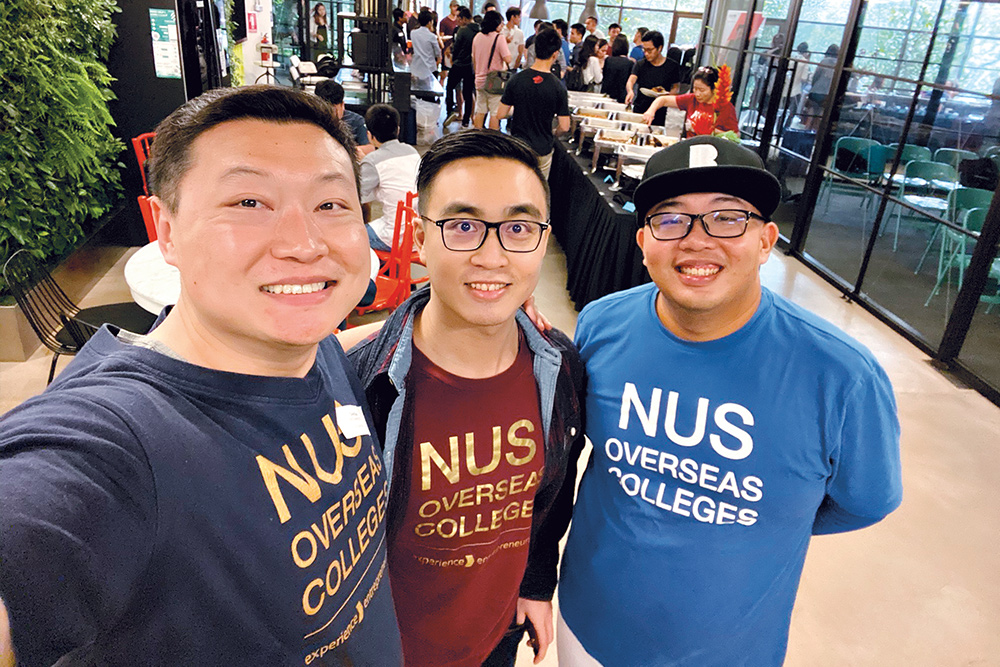 Mr Ding (left) with fellow NOC Alumni members.
Mr Ding (left) with fellow NOC Alumni members.
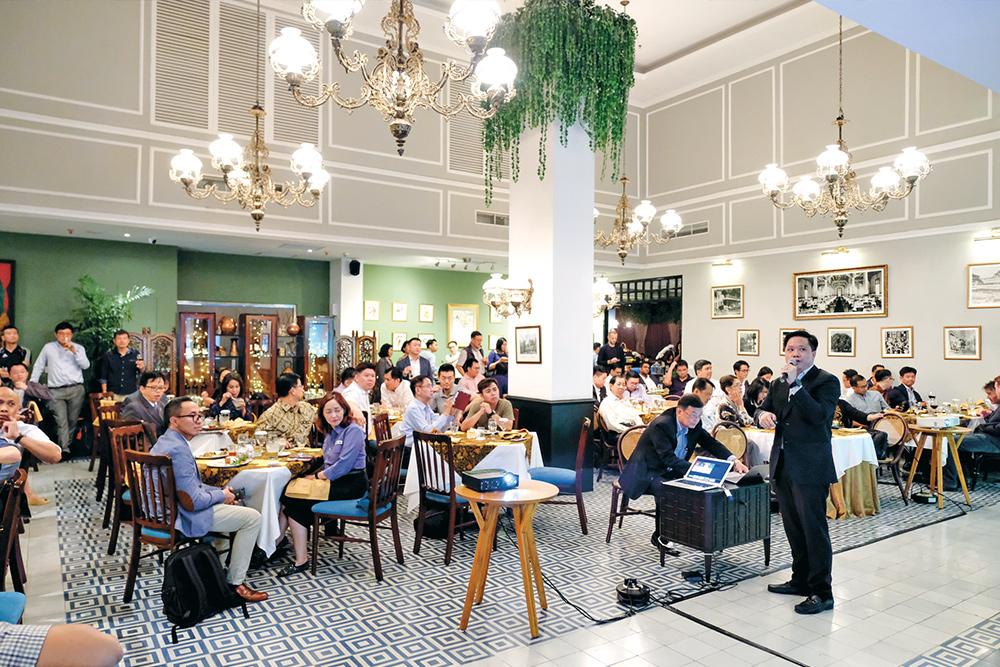 Mr Suwarto (standing, right) at an NUS EMBA Forum & Networking dinner in Jakarta in August 2019.
Mr Suwarto (standing, right) at an NUS EMBA Forum & Networking dinner in Jakarta in August 2019.
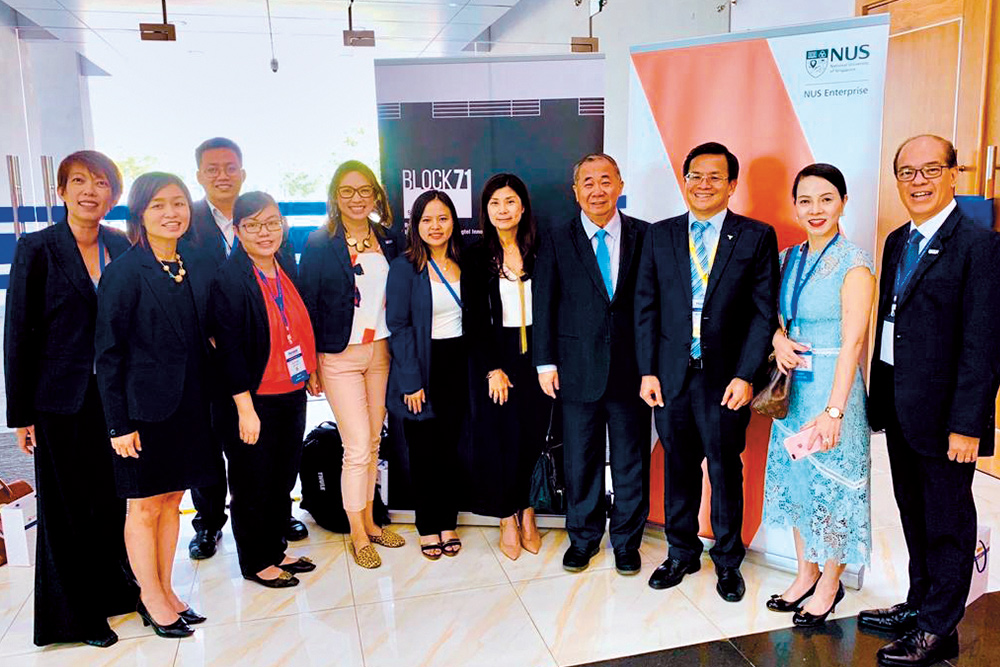 Mr Hai (third from right) with Prof Boey (fourth from right) and his team after the MOU signing ceremony for BLOCK71 Vietnam in November 2019.
Mr Hai (third from right) with Prof Boey (fourth from right) and his team after the MOU signing ceremony for BLOCK71 Vietnam in November 2019.